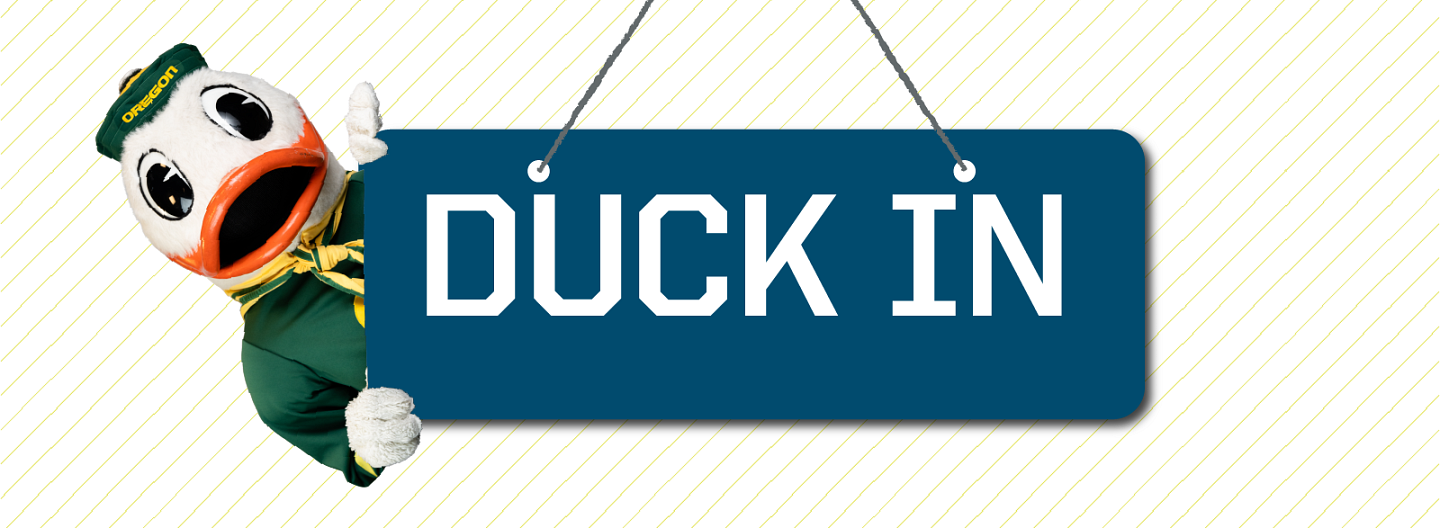
May 12-15, 2025
The Teaching Engagement Program invites faculty to participate in Duck In: Spring 2025, a week of class visits highlighting practices that promote student success and flourishing. Share your own practices by making a one-time offer of open seats in your class, and learn from colleagues by claiming seats they’ve opened and seeing them in action. The content we teach varies across courses and departments, but strategies that foster growth, community, resilience, purpose, and well-being—UO's domains of flourishing—can apply across disciplines and over different class sizes.
Lots of faculty have opened seats in their courses! Now is your chance to register to visit a class!

Visit a class
FREQUENTLY ASKED QUESTIONS (FAQs)
When can I sign up to visit a class?
- Now! Claim a seat.
Why should I visit a class?
- To see how another instructor fosters student success and flourishing and to spark ideas for your own teaching.
- To be reminded of what it’s like to experience a class from a student’s perspective.
- To connect with colleagues you might not otherwise see in action.
- Maybe to make a new friend!
There are so many courses to choose from! How should I decide which one to visit?
Think about strategies for fostering student success and flourishing that you're working on or would like to incorporate into your class. When you visit the Claim a Seat page, you'll be able to filter the offerings by practice, date, and time to find a course that works for you.Sometimes the most helpful and illuminating experiences come when faculty visit classes very different from their own: consider observing a class in a department far removed from yours or of a very different size than your own.And you're welcome to visit more than one course!
What should I look for when I visit?
While this is not a peer review, consider using TEP's Peer Review Template to guide your eye when you observe the class. Also, pay attention to what the students are doing: what kinds of activities are they doing? How do they engage with the instructor and with their peers?
Should I give feedback?
It takes courage to open one's classroom to colleagues, and we want our host faculty to have a good experience. So unless your host specifically asks for critical feedback, please center any conversation you have with them on positive aspects of the class and how you might incorporate practices you observed into your own courses.
This sounds great! Where can I see a list of classes and claim a seat?
Visit the Claim a Seat site and sign up now!
Open your class
FREQUENTLY ASKED QUESTIONS (FAQs)
What am I getting into if I open my class?
You'll control which day(s) to open your class in Week 7 and the maximum number of visitors you're comfortable with that would not be disruptive for your students. Visitors are advised not to provide critical feedback unless the host instructor unless asks for it.
What is the goal of the event?
There's no pressure to be perfect! Our goal is to connect faculty and spark ideas, especially across disciplines. No feedback is required, but we encourage visitors to let host instructors know exciting practices they saw and would like to try.
I teach a hybrid or asynchronous online course. Can I still participate?
Yes! If you teach a hybrid course, you can invite visitors to an in-person class session and, optionally, give them access to your Canvas site too. Asynchronous online instructors can add visitors to their Canvas sites. Those visitors will learn a lot from the structure and tone of your site as well as the flow of the content, assignments and assessments in the course.
What information will I need to provide in the signup form?
First, the obvious things like your name, email, the course name and title, the modality and, if relevant, the meeting time and location. Then we'll ask you to identify some strategies for fostering student success and flourishing that a visitor might see in your class:
- Building community and students’ sense of belonging
- Practicing and promoting a growth mindset
- Engaging students in active learning
- Connecting content to students’ lives, careers and social contexts
- Eliciting and valuing multiple perspectives and different ways of knowing
- Incorporating flexibility and options for student choice in their work
- Fostering student use of effective learning techniques and metacognition (planning, monitoring, and evaluating learning)
- Encouraging help-seeking and use of campus resources
- Incorporating mindfulness and wellbeing practices
Finally, we'll also ask you to provide one sentence about the context of your course and, especially, what you're proud of, working on, or inspired by as you think about it.
There's no extra work after signing up unless your visitors need access to your Canvas site, in which case you'll need to add them.
What's the signup deadline?
Signup for opening seats for Duck In 2025 has closed. Check out the classes your colleagues have opened and sign up to claim a seat!
